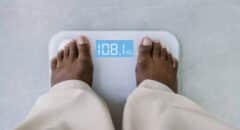
So your pants are too tight and you’re desperate to lose the extra weight as quickly as possible, but how much can you lose in a month?
Experts say there is no speedy way to shed pounds.
How long does it take to lose weight? According to the U.S. Centers for Disease Control and Prevention, people who succeed do it gradually at about 1 to 2 pounds per week, which translates into 4 to 8 pounds a month.
Because safely losing weight is such a gradual process, it can take six months or more to lose 30 pounds. But it’s well worth it as you change your lifestyle and look and feel better, experts say.
Losing weight permanently is really a matter of changing your lifestyle and diet. The best way is to set safe, achievable goals that you can meet.
That all starts with understanding that fad diets or highly restrictive eating plans may prompt fast weight loss, but not permanent weight loss.
“Fad diets, by today’s standards, do not work. By work, I mean a sustainable lifestyle that promotes a healthy weight and meets the nutrient needs of the individual,” said Samantha Heller, a nutritionist at NYU Langone Health in New York City.
“We need to buckle down and face the fact that a constant diet of fast, junk and prepared foods is not healthy,” Heller stressed in a recent HealthDay story. Beware: You can gain weight eating anything — even healthy food — so portions matter, she warned.
Once you’ve taken off the weight, rely on a healthy diet and exercise to keep the pounds off.
RELATED: Are These Weight Loss Programs Actually Worth The Money?
Getting started
The first step to a successful weight-loss program is taking a hard look at your diet. Make a list of what you eat and drink, including sugar-sweetened drinks and alcohol, the CDC says. Also, list your triggers to overeating. These can be:
- Eating too fast.
- Always cleaning your plate.
- Eating when not hungry.
- Eating while standing up (may lead to eating mindlessly or too quickly).
- Always eating dessert.
- Skipping meals (or maybe just breakfast).
But don’t just focus on the negative. Give yourself points for your good eating habits.
Also, list those things you do that are linked to overeating. These can include:
- Grabbing your favorite snack food.
- Watching TV.
- Eating before or after stress at work.
- Not planning a healthy meal.
- Eating sweets at work or during the day.
- Hitting a fast-food drive-through on the way to work.
- Using food to fight boredom or lift your mood.
Knowing your triggers you can make a special effort to avoid them, or replace them with healthier options. For example, you can bring healthy snacks to work and train yourself to avoid stopping at fast-food drive-throughs.
Going back to your list, you can start by replacing unhealthy eating with healthy choices and healthy habits.
Only eat when you are hungry and don’t gobble your food, rather, eat slowly. If you eat when bored, try taking up another activity that doesn’t involve food.
RELATED: Why Can’t I Lose Weight?
A healthy diet
A healthy diet consists of fruits, vegetables, whole grains and dairy products, the CDC says. Also add a variety of proteins, such as seafood, lean meats and poultry, eggs, beans and peas, soy products, nuts and seeds.
A healthy diet should be low in sugar, salt, saturated and trans fats and cholesterol.
You can swap water, seltzer, or unsweetened fruit juices or diet drinks, for sugary drinks and sodas.
But it’s not only what you eat, but how much you eat. Weight gain and weight loss is a matter of how many calories you eat versus how many calories you burn.
Cutting calories
People live in a society surrounded by food, where it’s easy to satisfy any craving. Most people tend to eat more calories than they need and thus gain weight.
Research had found that about 3,500 calories equal about 1 pound of fat, according to the Mayo Clinic. So burning or cutting 500 calories a day might lead to losing 1 pound a week. But that’s not true for everyone. Most women need 1,600 to 2,400 calories a day, while men need about 2,000 to 3,000 calories. But if you’re overweight or obese you’re probably eating more than these recommended levels.
One way to cut calories is to swap high-calorie foods for low-calorie ones. For example, a flavored latte has about 268 calories, while black coffee has only 5. A cup of chocolate ice cream has 292 calories, while a cup of strawberries has only 60. And 16-ounces of soda has 200 calories, while the same amount of sparkling water has 0.
You can do this with most foods, and pretty soon you will be dropping calories and shedding pounds.
Cutting portion sizes
The sizes of portions affect how many calories you eat. Lots of high-calorie foods mean piling on the calories, while you can eat more of low-calorie foods.
For example, 8 ounces of orange juice has about 112 calories, but a 4-ounce glass had only 56.
In addition to changing your diet, you also need to be active and exercise. Regular activity and healthy eating is the best way to lose weight and maintain a healthy weight.
“Your weight loss and maintenance need to be sustainable forever,” Heller said. “When you are very focused on creating healthy eating habits, you can maintain those habits even on vacation. It doesn’t mean you can’t try new foods, but you do have to watch your portions.”









